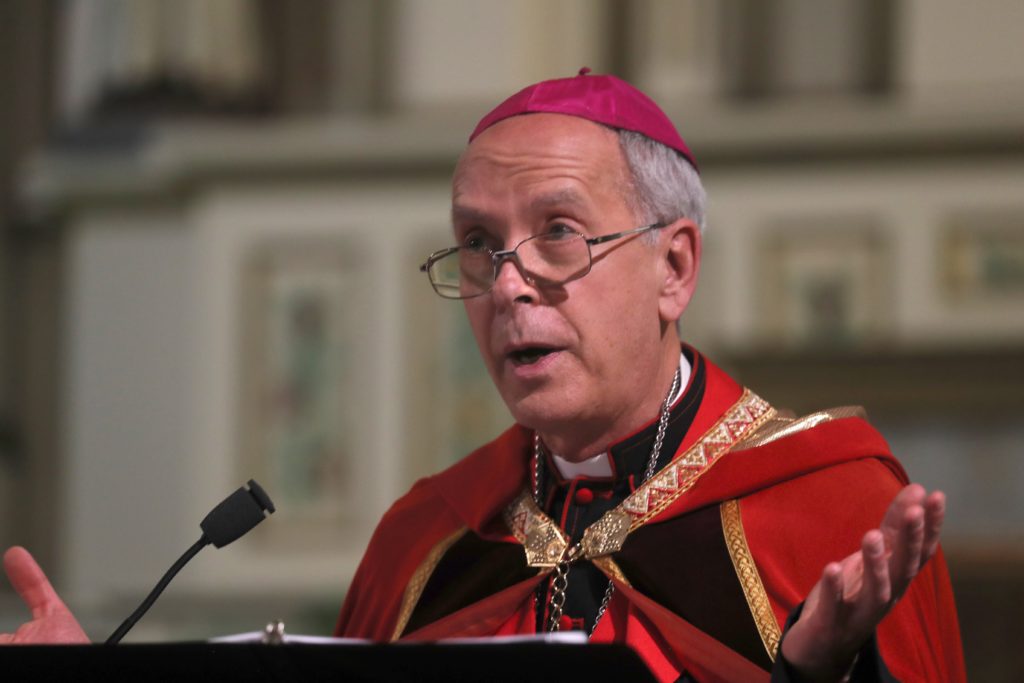Ahead of a March 24 immigrant solidarity rally he organized in El Paso, OSV News interviewed Bishop Mark J. Seitz, who heads that diocese, for his thoughts on current U.S. immigration policy and the challenges faced by those he serves in his borderlands community. Bishop Seitz currently chairs the U.S. Conference of Catholic Bishops' Committee on Migration.
This interview has been edited for clarity and length.
OSV News: What are you hearing from the people you serve about immigration and current administration's policies? What are they experiencing?
Bishop Seitz: Well, I'm hearing a lot of concern from so many different places within my diocese.
First of all, of course, you have to think about the immigrants that are here, and there are so many that have found a home in this area, (but) perhaps haven't completed the years-long process of being fully naturalized.
We have others who, for whatever reason, have come here and tried to live without being seen.
But now, all of them, even those who really have citizenship, have come up to me and told me how fearful they are that they might be caught up in this web (of immigration arrests and deportations) without being able to really have recourse.
In the past, there has been a careful process before we ever decided to deport someone to see whether they're eligible for asylum or to see whether they have documentation to stay. But now, there's no assurance.
They're afraid, and understandably so, that they might just find themselves one day caught up in this and then deported without recourse. So, that group is fearful.
I think there are very few that live in this area of the United States, close to the border, that don't know the story. (There are) very few people in El Paso who don't have family on the other side (of the border, in Mexico), and know the reality of the life-threatening situations that many people face that cause them to seek refuge in our country. And they have to do it quickly. So, they understand those stories.
I've heard a lot of concern, even in our remoter, rural parishes, about those among them who they know are suffering right now, and concern that their families might be broken up and so on. So, a lot of fear in our community.
OSV News: Given the recent shifts in U.S. immigration policies, do you see a hardness of heart among the population regarding the issue of immigration?
Bishop Seitz: I've actually said in the past that one role that a bishop has is to be a doctor of souls. We're given those letters, "D.D.," after our name, which is humbling. It means "doctor of divinity."
But as I step into that role, which I trust that the Spirit has led me to, I have to diagnose a problem in our country that is hardness of heart. In a physical sense, when our veins, our arteries, our heart itself is no longer of flesh but calcified, it has problems.
And I'm very concerned. You might even say I'm more concerned about us than them, than the immigrants among us, because we're losing something that is essential for us to be who we are, to have our own particular identity as a country of immigrants that welcomes people who are different than ourselves.
So I'm very concerned for us, not only them.
OSV News: You've been to the Dárien Gap (a deadly 60-mile migration transit route between Colombia and Panama), and you're very familiar with the root causes of immigration. What are your thoughts on addressing those causes?
Bishop Seitz: Yes, I've had the chance to see what lengths people are willing to go to in order to escape the situation in their own country.
We've got to help people understand in our country that they're not simply looking to have a nicer car. People are fleeing for their lives. That's why they'll take chances. They're fleeing for their children's lives. That's why they'll risk everything.
That's why even sometimes if they can't travel themselves, they'll send their children. People say, "How could somebody do that?" Well, only if they don't feel there's another possibility for their life.
So it's difficult for us in the United States, who have grown up in a country that has had incomparable order and tranquility, to begin to put ourselves in the place of others. But that's what we need to do.
And all I ask people, they don't have to take my word necessarily. Talk to an immigrant. Listen to their story. Once you know them, you'll evaluate things differently.
It's not to say … that a person who comes to our country shouldn't be vetted. It's not to say that we should let in everybody that comes to our border. By no means; the church doesn't teach that. But it is to say that our hearts have to be a lot more open than they are right now.
OSV News: The name of the rally and vigil you're about to lead tonight in El Paso is "Aquí Estamos" ("We Are Here"). Catholicism is a religion of presence, from the Real Presence of the Eucharist to faithful's presence to one another in evangelization and works of mercy. Talk about how the title for tonight's event ties in the faith's focus on presence.
Bishop Seitz: It's so important in moments like these, in moments when people are suffering, in moments when people feel abandoned, when people feel alone -- it's so important for us as brothers and sisters in Christ to be there, to step up, to show our love and concern.
Even though we really can't tell them everything will be OK right now, we can tell them, "You're not alone. We will walk with you. We love you. We see your dignity as a child of God, and we will not abandon you even when things get difficult."

